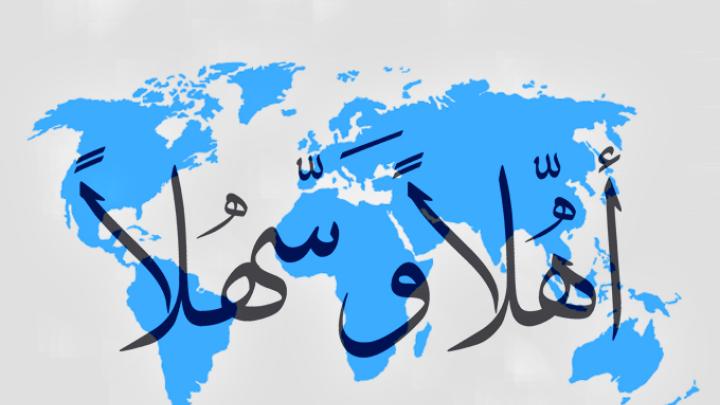Without knowing the language of a people, we never really know their thoughts, their feelings, and their type of character,” John Stuart Mill said in his first speech as lord rector of the University of St. Andrews, in 1865. “Unless we do possess this knowledge, of some other people than ourselves, we remain, to the hour of our death, with our intellects only half expanded.”
Mill’s sterling reputation for prescience goes unchallenged here: Little could be said to ail our world more than the misjudgment of the thoughts, feelings, and characters of the foreign. And for no language is this phenomenon more rampant than for the one I’ve chosen to study at Harvard—Arabic.
Among peers, news of this entirely voluntary pursuit is often met with a mixture of bewilderment and pity, mostly the latter. They often ask why, and I often give the higher-minded, Millian answer—that I seek to understand the often demonized peoples of the Middle East in their own terms and contexts—but it’s not the whole story. There’s also the sheer joy of learning a language, of falling headfirst into a new, endless sea and learning how to swim all over again.
In truth, Arabic had been a lifelong companion, or at least a familiar second cousin, even before Harvard. Muslims from all over the world, including my parents’ Pakistan, learn the liturgical language of Islam, memorizing the requisite Qur’anic passages and supplications. In their five daily prayers, devout Muslims will utter the Fatihah, the first chapter of the Qur’an, a minimum of 17 times, quite possibly with only a vague understanding of its meaning.
Learning the classics of a language before its mechanics makes for quite the déjà vu. Imagine first learning Hamlet by heart before studying any English grammar, and you’ll approximate the curious, simultaneous familiarity and foreignness of my first endeavors in Arabic. While it’s good to be able to spout Polonius’s maxims at whim, to speak like Polonius at all hours would be decidedly uncomfortable for all concerned.
Of course, there’s a reason that, in our language departments, modern Greek courses do not begin with Euripides, Sanskrit is not a prerequisite for Hindi, and students of living Slavic languages are not subjected to the horrors of Old Church Slavonic (unless, of course, they are graduate students). Naturally, there is also quite a difference between the Bedouin Arabic spoken during the first writing of the Qur’an and the Arabic spoken in Cairo, Riyadh, and Baghdad today.
At Harvard, the first years of Arabic require an hour of class a day. By dumb luck of birth, I retained several advantages over the brave souls attempting the language afresh. The writing is a simple cursive that everyone can master soon enough, but the phonetics are another story. As The Economist’s style guide colorfully puts it, “there are three sounds–a glottal stop like a hiccup, a glottal sound akin to strangulation, and a uvular trill like a Frenchman gargling–which have no [English] equivalent except occasionally in the East End of London.” Having studied with Egyptian tutors—family friends who volunteered their time—my pronunciation had been drilled to near perfection. The minutiae matter: qalbi, meaning “my heart,” is a term of endearment, whereas kalbi, the variant easier for Westerners to say, is a rather derogatory term meaning “my dog.”
The preceptors here are endlessly energetic and creative. One was a devoted classicist who regularly assigned full verbal conjugations, spanning a breezy 60 or so forms, and delighted in explaining the advanced grammars of medieval texts. Another spoke fast colloquial Egyptian and prepared her own chapters on vocabulary, usage, and grammar that put the textbook to shame. We were regularly assigned news videos of commentators speaking much too quickly and with too many exotic words—until one day some of the words started to make sense.
Another valuable lesson I learned: languages, like species, evolve constantly and continuously. Unfortunate words and expressions are condemned to the dustbins of disuse and anachronism, and glitzy newcomers from foreign tongues or contemporary coinages come to take their place. (This year, the Oxford Dictionaries’ word of the year is not even a word; it’s the “Face with Tears of Joy” emoticon.) Nostalgists bemoan these changes and reactionaries call for the return to the purer language of yore, until they, too, pass into obscurity.
Few purists match the Arab grammarians, beginning with the great Persian linguist Sibawayh, who first set out its strictures in his Al-Kitab, published in the eighth century. They have long cosseted the grammatical intricacies that undergirded the elegant tongue and have sought to insulate them from foreign influence or change. It’s easy to see the allure, and to admire their transfixion. The central construct of a word in Arabic, as in its sister Semitic languages, is the root: a group of three or four consonants that give a general idea or theme. From there, nearly all shades of meaning can be built through fixed rules: add a long vowel, and you have the active participle; garnish with the right vowels and you have a past-tense verb; double the right consonant and that verb has now become reflexive. Transitivity, reciprocity, intensification—all these properties are hard-coded into the structure of the verb itself, instead of relying on auxiliary words (“might,” for example) required in English. The language’s near algebra (a word of Arabic origin, by the way) can move both the poet and mathematician to tears.
Steadily, however, some features have been dropped. No longer is there an “energetic mood,” a separate conjugation system used to connote enthusiasm or importance for verbs. Style and arrangement have evolved under the influence of European texts and conquests.
But much of the character, and difficulties, of the classical grammar—the 14 subject pronouns, the inflection of nouns and verbs due to case—remain in use to this day in a curious construct known as Modern Standard Arabic, or fus’ha (meaning, literally, “the most eloquent”) to natives. This is the speech of newscasts, statecraft, sermons, and university lectures. Outside these formal contexts, however, hardly anyone speaks fus’ha. Were you to try it out in a street bazaar, as so many foreign students fresh from their first classes unwittingly do, you would seem as pretentious and ridiculous as Ignatius J. Reilly. Arabic speakers use the local dialect, known as ‘amiyah, or “the common tongue.” Linguists refer to this phenomenon—a sharp discontinuity between “high” and “low” registers of a language that are in simultaneous use—as diglossia.
These dialects have many welcome features—much simpler grammars, with six subject pronouns rather than 14; case rules are generally ignored—and one rather unfortunate characteristic: dialects vary substantially. Everything, from the pronunciation of letters (and addition of new letters) to conjugations and vocabularies, changes dramatically. An Iraqi seeking directions from a Cairo shopkeeper might remain helplessly lost, yet both are nominally speaking the same language.
What this may illuminate is the vast diversity of people often characterized by little more than generalities, if not outright stereotypes—as when Western officials and analysts lazily drift into discussions of a mythologized “Arab world,” with seeming disregard for its actual varieties of experience—religious, linguistic, political. There are Sunnis and Shiites, of course, but also Christians and Druze. Some live under kingship, others under democracy (or “democracy,” as it were). There are Salafis and Muslim Brothers, but also secularists, feminists, and atheists. Debates about religion and society rage continuously on Arab television stations, opinion pages, and especially Twitter.
For me as an occasional writer and close follower of the region, it is immensely informative to follow BBC Arabic, or to be able to read the Egyptian state-controlled paper Al-Ahram and decipher what may go unmentioned in The New York Times.
But what I’ve loved most is the immense volume of poetry, untranslated and perhaps untranslatable, that I’ve been able to access—never without the close companionship of my dictionary, of course. Poetry has always been regarded as the highest form of art in Arab society. Part of its beauty comes from the nature of its word roots, but much has to do with case. English-speakers infer case from word order—“Nabokov wrote Lolita” is different from “Lolita wrote Nabokov” because of a fixed subject-verb-object structure. But in Arabic, case doesn’t rely on word order, leaving the poet to experiment with a whole array of structures impossible in English. Actions may be attributed to a subject that goes unnamed till the final word of a stanza—a sublime occultation.
All this experience is closed to most Western observers for whom information about the Middle East must be not just translated, but funneled first through a filter of newsworthiness. Invariably, the views they receive are the most extreme—the most dangerous and upsetting. Yet onward they go, intellects only half expanded.








